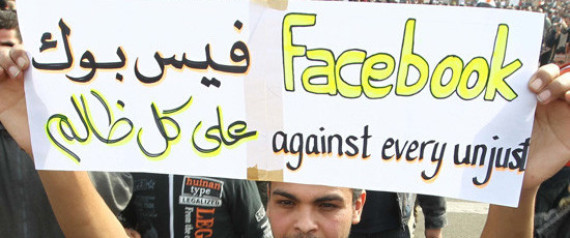
We are all familiar with Ashton Kutcher's over-zealous support of Twitter's power, which I scoffed at until recently. Freedom of speech is one of the bedrocks of democracy, it seems linear that global instantaneous communication would be an immensely powerful tool for freedom. Could Kutcher be right? Nicholas Thompson at the New Yorker cautiously agrees that the internet is changing democracy all over the world, here. During the revolutions in northern Africa that I began considering these technologies more seriously. See huff post article about Facebook and Cairo here. (also the above image source)
 Surveillance technology was associated with oppressive regimes, and used to quell protests and radicals. Yet, now that this technology is so pervasive and accessible (if you live in an area with internet and have a cell phone, which is a big if) you can turn the powers of surveillance back onto the oppressor. There are certainly more humans in the world who don't want to be beaten by police, raped by militia, left to starve by their governments, than there are officials who are supporting those actions. Collectively, the people, now have equal tools.
Surveillance technology was associated with oppressive regimes, and used to quell protests and radicals. Yet, now that this technology is so pervasive and accessible (if you live in an area with internet and have a cell phone, which is a big if) you can turn the powers of surveillance back onto the oppressor. There are certainly more humans in the world who don't want to be beaten by police, raped by militia, left to starve by their governments, than there are officials who are supporting those actions. Collectively, the people, now have equal tools.I felt that my suspicions around the power of the web were confirmed after reading James Glanz and John Markoff's (where I stole the above photo) fascinating article HERE about liberation-technology and the United States' involvement with supplying internet to the dissidents of oppressive governments like in Afghanistan. (I first saw this story on BLDGBLG, here(scroll to the third point))
I think that these technologies are interesting because, unlike the guns we gave to middle-eastern soldiers to fight the soviets which are now being used against us, accessible internet can really only open up communication and spread ideas and information, which seems inherently good. (Wait, maybe computer viruses could do more damage with these technologies... hmmm.)
I wonder if the problem now will become a matter of filtering. We are inundated with videos of police beatings, photos of deadly conflicts, news broadcasts of nuclear meltdowns/earthquakes/tornados, and the list goes on. How many of you Do anything about these stories? I hate to admit it, but I sure as hell don't do anything; I get a little sad and stop reading the international section of the news... I feel overwhelmed by the world's mess that I simply choose to bury my head in the contemporary art world. I know I am not alone.
PLUS, we are using the internet for videos of cute fuzzy kittens, not spreading democracy. The most viewed youtube video of all time is a Justin Bieber and Ludacris video, with 579,715,348 views, that is larger than the population of NORTH AMERICA. Is this some weird by-product of late-capitalism? Do you need to be both poor and oppressed to use the internet in any meaningful way? this coming from someone with a blog...
Im ranting so, hope this was some food for thought.

No comments:
Post a Comment